Edie Melson's Blog, page 392
December 11, 2014
How a Novel Ends
Before we get today's post, I want to make sure you know about this amazing give-away!
 The great give-away from Warren Adler is still going on. He'll be giving away 600 free ebooks. Just leave me a comment with your email address AND THE BOOK YOU WANT, and I'll see that you get put on the list!
The great give-away from Warren Adler is still going on. He'll be giving away 600 free ebooks. Just leave me a comment with your email address AND THE BOOK YOU WANT, and I'll see that you get put on the list!
Now back to our regularly scheduled post!
* * * How a Novel Ends
by Warren Adler @WarrenAdler
 Roderick Thorp was part of a small group of novelists who came together on a monthly basis in the late eighties in Los Angeles to chew the fat. Rod had made a breakthrough success at the age of twenty-seven with the novel The Detective, which became a very successful movie that starred Frank Sinatra. Rod’s novel Nothing Lasts Forever was the source material for the tremendously successful movie Die Hard and its numerous sequels.
Roderick Thorp was part of a small group of novelists who came together on a monthly basis in the late eighties in Los Angeles to chew the fat. Rod had made a breakthrough success at the age of twenty-seven with the novel The Detective, which became a very successful movie that starred Frank Sinatra. Rod’s novel Nothing Lasts Forever was the source material for the tremendously successful movie Die Hard and its numerous sequels.
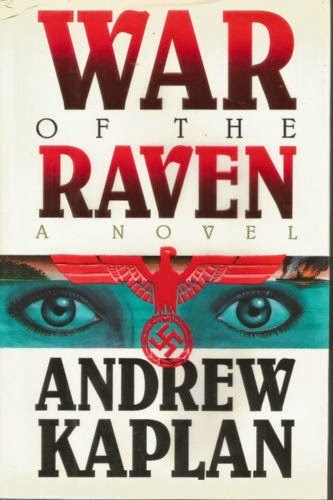 This group of novelists, founded by yours truly and the great thriller novelist Andrew Kaplan (War of the Raven), also included Ib Melchior (Robinson Crusoe on Mars), whose novels and stories about his experiences in World War II are now classics; S.L. “Sid” Stebel, a novelist and celebrated writing teacher; Mann Rubin, a playwright and successful screenwriter; and Brian Garfield (The Thousand-Mile War: World War II in Alaska and the Aleutians), a prolific best-selling author whose novel Death Wish spawned numerous sequels.
This group of novelists, founded by yours truly and the great thriller novelist Andrew Kaplan (War of the Raven), also included Ib Melchior (Robinson Crusoe on Mars), whose novels and stories about his experiences in World War II are now classics; S.L. “Sid” Stebel, a novelist and celebrated writing teacher; Mann Rubin, a playwright and successful screenwriter; and Brian Garfield (The Thousand-Mile War: World War II in Alaska and the Aleutians), a prolific best-selling author whose novel Death Wish spawned numerous sequels.
They were all savvy, extraordinarily talented writers, each with stellar resumes of achievement. Although we talked in general about the ups and downs of the writer’s life, much of our conversation was about movies, conflicts with of our publishers, and various events of the day. Our group was the highlight of my life during my six year stay in LA, some of which was spent on the Warner Lot, where my most pleasant memory was the time I spent daily in the commissary.
Rod and Mann have since passed on, but the group, although its members are a bit long in the tooth now, continues to meet, and whenever I am in LA I join them happily. There is a strange bond that exists among writers of the imagination, and I believe we all felt the same way about the sheer joy of coming out of our lonely scribbling caves to meet together, as if it were a reunion of comrades taking time off from the battlefield.
Sometimes a casual remark by one of my writing friends would strike a chord that lingered and expanded into some indelible and profound insight that continued to resonate through the years. One of these remarks came from the irrepressible Rod, who once opined that if he knew how a novel of his ends he wouldn’t write it.
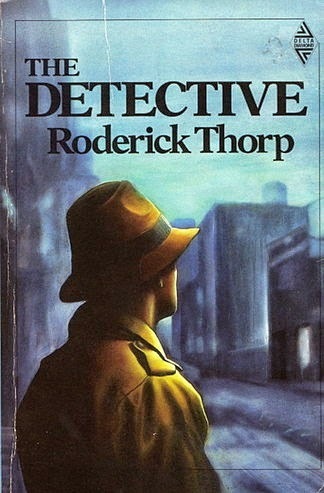 In my opinion, that remark nailed the existential dilemma of the novelist’s art. What constitutes the end of a story, and how is it achieved?
In my opinion, that remark nailed the existential dilemma of the novelist’s art. What constitutes the end of a story, and how is it achieved?
Rod’s idea articulated the way novels should be written. I had always pursued my novel writing using this method to achieve a proper ending, but it was Rod who articulated this perspective without compromise. What he meant was that a creative and serious novelist cannot presume the ending in advance.
Such a pronouncement, of course, is open to argument. Many novelists do approach their work with an ending in mind and work backward to create elements that lead inexorably to that prearranged finale. Most genre novels end this way. Indeed, that is why they are categorized as “genre.” To achieve this categorization, they follow well-trodden plot paths to a preconceived and genre-prescribed ending. They employ a skillset requiring ingenuity and talent, and I don’t in any way wish to disparage their effort.
As I interpret Rod’s pronouncement on endings, our method is to create our characters from a basic idea that has flown mysteriously into our imagination, and follow them on their path to their destiny, as if we might have a doppelganger watching over our shoulder, eagerly following the story. What happens next, we know, is at the very heart of storytelling; like life, it is a walk into the unknown. As the scotch poet Robert Burns so elegantly declared in his poem “The Mouse,” roughly quoted: “The best laid schemes of mice and men oft go awry.”
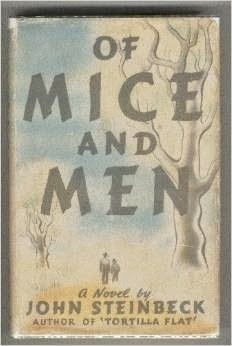 As you can see, John Steinbeck had uncovered the perfect title for his wonderful novel Of Mice and Men, which in a way underlines the thesis under discussion in this blog. For those who know the story, Lenny’s fate is organic to the ending of that great novel.
As you can see, John Steinbeck had uncovered the perfect title for his wonderful novel Of Mice and Men, which in a way underlines the thesis under discussion in this blog. For those who know the story, Lenny’s fate is organic to the ending of that great novel.
For an author, the real excitement and inspiration, the joy of creation, comes in tracking the fate of their created characters into that unknown future. To the creator, these characters become real, full-blooded, and three-dimensional. If the writer knows in advance the fate of these characters, the effort is merely a lifeless mechanical construct.
Unlike life, which always ends in death, a novel’s end can be described as happy, sad, conclusive or inconclusive, disappointing or satisfying, but it is that crucial moment, the climax, that closes the experience for the reader.
One does not question God’s sequence of events in creating the world, nor why he or she decides to rest on the seventh day. As they say, it is what it is.
TWEETABLES
Great American Novelist @WarrenAdler weighs in on How a Novel ends on @EdieMelson (Click to Tweet)
Learning from the masters - How a Novel Ends - via @Warren Adler on @EdieMelson (Click to Tweet)
 Warren Adler is best known for The War of the Roses, his masterpiece fictionalization of a macabre divorce turned into the Golden Globe and BAFTA nominated dark comedy hit starring Michael Douglas, Kathleen Turner and Danny DeVito. Adler's international hit stage adaptation of the novel will premiere on Broadway in 2015-2016. Adler has also optioned and sold film rights for a number of his works including Random Hearts (starring Harrison Ford and Kristen Scott Thomas) and The Sunset Gang (produced by Linda Lavin for PBS' American Playhouse series starring Jerry Stiller, Uta Hagen, Harold Gould and Doris Roberts). In recent development are the Broadway Production of The War of the Roses, to be produced by Jay and Cindy Gutterman, The War of the Roses - The Children (Grey Eagle Films and Permut Presentations), a feature film adaptation of the sequel to Adler's iconic divorce story, Target Churchill (Grey Eagle Films and Solution Entertainment),Mourning Glory, to be adapted by Karen Leigh Hopkins, and Capitol Crimes (Grey Eagle Films and Sennet Entertainment), a television series based on his Fiona Fitzgerald mystery series. Warren Adler's newest thriller, Treadmill, is officially available.
Warren Adler is best known for The War of the Roses, his masterpiece fictionalization of a macabre divorce turned into the Golden Globe and BAFTA nominated dark comedy hit starring Michael Douglas, Kathleen Turner and Danny DeVito. Adler's international hit stage adaptation of the novel will premiere on Broadway in 2015-2016. Adler has also optioned and sold film rights for a number of his works including Random Hearts (starring Harrison Ford and Kristen Scott Thomas) and The Sunset Gang (produced by Linda Lavin for PBS' American Playhouse series starring Jerry Stiller, Uta Hagen, Harold Gould and Doris Roberts). In recent development are the Broadway Production of The War of the Roses, to be produced by Jay and Cindy Gutterman, The War of the Roses - The Children (Grey Eagle Films and Permut Presentations), a feature film adaptation of the sequel to Adler's iconic divorce story, Target Churchill (Grey Eagle Films and Solution Entertainment),Mourning Glory, to be adapted by Karen Leigh Hopkins, and Capitol Crimes (Grey Eagle Films and Sennet Entertainment), a television series based on his Fiona Fitzgerald mystery series. Warren Adler's newest thriller, Treadmill, is officially available.
 The great give-away from Warren Adler is still going on. He'll be giving away 600 free ebooks. Just leave me a comment with your email address AND THE BOOK YOU WANT, and I'll see that you get put on the list!
The great give-away from Warren Adler is still going on. He'll be giving away 600 free ebooks. Just leave me a comment with your email address AND THE BOOK YOU WANT, and I'll see that you get put on the list!Now back to our regularly scheduled post!
* * * How a Novel Ends
by Warren Adler @WarrenAdler
 Roderick Thorp was part of a small group of novelists who came together on a monthly basis in the late eighties in Los Angeles to chew the fat. Rod had made a breakthrough success at the age of twenty-seven with the novel The Detective, which became a very successful movie that starred Frank Sinatra. Rod’s novel Nothing Lasts Forever was the source material for the tremendously successful movie Die Hard and its numerous sequels.
Roderick Thorp was part of a small group of novelists who came together on a monthly basis in the late eighties in Los Angeles to chew the fat. Rod had made a breakthrough success at the age of twenty-seven with the novel The Detective, which became a very successful movie that starred Frank Sinatra. Rod’s novel Nothing Lasts Forever was the source material for the tremendously successful movie Die Hard and its numerous sequels.
 This group of novelists, founded by yours truly and the great thriller novelist Andrew Kaplan (War of the Raven), also included Ib Melchior (Robinson Crusoe on Mars), whose novels and stories about his experiences in World War II are now classics; S.L. “Sid” Stebel, a novelist and celebrated writing teacher; Mann Rubin, a playwright and successful screenwriter; and Brian Garfield (The Thousand-Mile War: World War II in Alaska and the Aleutians), a prolific best-selling author whose novel Death Wish spawned numerous sequels.
This group of novelists, founded by yours truly and the great thriller novelist Andrew Kaplan (War of the Raven), also included Ib Melchior (Robinson Crusoe on Mars), whose novels and stories about his experiences in World War II are now classics; S.L. “Sid” Stebel, a novelist and celebrated writing teacher; Mann Rubin, a playwright and successful screenwriter; and Brian Garfield (The Thousand-Mile War: World War II in Alaska and the Aleutians), a prolific best-selling author whose novel Death Wish spawned numerous sequels.They were all savvy, extraordinarily talented writers, each with stellar resumes of achievement. Although we talked in general about the ups and downs of the writer’s life, much of our conversation was about movies, conflicts with of our publishers, and various events of the day. Our group was the highlight of my life during my six year stay in LA, some of which was spent on the Warner Lot, where my most pleasant memory was the time I spent daily in the commissary.
Rod and Mann have since passed on, but the group, although its members are a bit long in the tooth now, continues to meet, and whenever I am in LA I join them happily. There is a strange bond that exists among writers of the imagination, and I believe we all felt the same way about the sheer joy of coming out of our lonely scribbling caves to meet together, as if it were a reunion of comrades taking time off from the battlefield.
Sometimes a casual remark by one of my writing friends would strike a chord that lingered and expanded into some indelible and profound insight that continued to resonate through the years. One of these remarks came from the irrepressible Rod, who once opined that if he knew how a novel of his ends he wouldn’t write it.
 In my opinion, that remark nailed the existential dilemma of the novelist’s art. What constitutes the end of a story, and how is it achieved?
In my opinion, that remark nailed the existential dilemma of the novelist’s art. What constitutes the end of a story, and how is it achieved? Rod’s idea articulated the way novels should be written. I had always pursued my novel writing using this method to achieve a proper ending, but it was Rod who articulated this perspective without compromise. What he meant was that a creative and serious novelist cannot presume the ending in advance.
Such a pronouncement, of course, is open to argument. Many novelists do approach their work with an ending in mind and work backward to create elements that lead inexorably to that prearranged finale. Most genre novels end this way. Indeed, that is why they are categorized as “genre.” To achieve this categorization, they follow well-trodden plot paths to a preconceived and genre-prescribed ending. They employ a skillset requiring ingenuity and talent, and I don’t in any way wish to disparage their effort.
As I interpret Rod’s pronouncement on endings, our method is to create our characters from a basic idea that has flown mysteriously into our imagination, and follow them on their path to their destiny, as if we might have a doppelganger watching over our shoulder, eagerly following the story. What happens next, we know, is at the very heart of storytelling; like life, it is a walk into the unknown. As the scotch poet Robert Burns so elegantly declared in his poem “The Mouse,” roughly quoted: “The best laid schemes of mice and men oft go awry.”
 As you can see, John Steinbeck had uncovered the perfect title for his wonderful novel Of Mice and Men, which in a way underlines the thesis under discussion in this blog. For those who know the story, Lenny’s fate is organic to the ending of that great novel.
As you can see, John Steinbeck had uncovered the perfect title for his wonderful novel Of Mice and Men, which in a way underlines the thesis under discussion in this blog. For those who know the story, Lenny’s fate is organic to the ending of that great novel.For an author, the real excitement and inspiration, the joy of creation, comes in tracking the fate of their created characters into that unknown future. To the creator, these characters become real, full-blooded, and three-dimensional. If the writer knows in advance the fate of these characters, the effort is merely a lifeless mechanical construct.
Unlike life, which always ends in death, a novel’s end can be described as happy, sad, conclusive or inconclusive, disappointing or satisfying, but it is that crucial moment, the climax, that closes the experience for the reader.
One does not question God’s sequence of events in creating the world, nor why he or she decides to rest on the seventh day. As they say, it is what it is.
TWEETABLES
Great American Novelist @WarrenAdler weighs in on How a Novel ends on @EdieMelson (Click to Tweet)
Learning from the masters - How a Novel Ends - via @Warren Adler on @EdieMelson (Click to Tweet)
 Warren Adler is best known for The War of the Roses, his masterpiece fictionalization of a macabre divorce turned into the Golden Globe and BAFTA nominated dark comedy hit starring Michael Douglas, Kathleen Turner and Danny DeVito. Adler's international hit stage adaptation of the novel will premiere on Broadway in 2015-2016. Adler has also optioned and sold film rights for a number of his works including Random Hearts (starring Harrison Ford and Kristen Scott Thomas) and The Sunset Gang (produced by Linda Lavin for PBS' American Playhouse series starring Jerry Stiller, Uta Hagen, Harold Gould and Doris Roberts). In recent development are the Broadway Production of The War of the Roses, to be produced by Jay and Cindy Gutterman, The War of the Roses - The Children (Grey Eagle Films and Permut Presentations), a feature film adaptation of the sequel to Adler's iconic divorce story, Target Churchill (Grey Eagle Films and Solution Entertainment),Mourning Glory, to be adapted by Karen Leigh Hopkins, and Capitol Crimes (Grey Eagle Films and Sennet Entertainment), a television series based on his Fiona Fitzgerald mystery series. Warren Adler's newest thriller, Treadmill, is officially available.
Warren Adler is best known for The War of the Roses, his masterpiece fictionalization of a macabre divorce turned into the Golden Globe and BAFTA nominated dark comedy hit starring Michael Douglas, Kathleen Turner and Danny DeVito. Adler's international hit stage adaptation of the novel will premiere on Broadway in 2015-2016. Adler has also optioned and sold film rights for a number of his works including Random Hearts (starring Harrison Ford and Kristen Scott Thomas) and The Sunset Gang (produced by Linda Lavin for PBS' American Playhouse series starring Jerry Stiller, Uta Hagen, Harold Gould and Doris Roberts). In recent development are the Broadway Production of The War of the Roses, to be produced by Jay and Cindy Gutterman, The War of the Roses - The Children (Grey Eagle Films and Permut Presentations), a feature film adaptation of the sequel to Adler's iconic divorce story, Target Churchill (Grey Eagle Films and Solution Entertainment),Mourning Glory, to be adapted by Karen Leigh Hopkins, and Capitol Crimes (Grey Eagle Films and Sennet Entertainment), a television series based on his Fiona Fitzgerald mystery series. Warren Adler's newest thriller, Treadmill, is officially available.
Published on December 11, 2014 01:00
December 10, 2014
Writers, Make the Most of Your 15-Minute Conference Appointments
by Cindy Sproles @CindyDevoted
 Chapel steeple at the Cove, site
Chapel steeple at the Cove, site
of the Writer's Advance Bootcamp.Edie here. I'm excited today to welcome the director of the Writer's Advance Bootcamp conference, Cindy Sproles. As an author and conference director, she knows the tips and tricks writers need for a successful conference experience. I have a soft spot for Writer's Advance and think it's one of the most valuable small conferences around. It takes place in the Blue Ridge Mountains and registration is now open.
Made the Most of Your 15-Minute Appointments
As conference time nears, conferees dig down and prepare to meet one-on-one with publishers, agents, and editors. The wonderful advantage of attending a conference is this “free-card” to meet face to face with industry professionals. The publishing market has tightened to the point of strangulation. Publishers are overworked and understaffed, so to meet with them at a conference is an amazing opportunity.
 These appointments are an open door.During these meetings publishers (and agents) will extend an open door opportunity for writers to submit their work directly to them during a specific time frame. Does this increase your opportunity at publication? Some.
These appointments are an open door.During these meetings publishers (and agents) will extend an open door opportunity for writers to submit their work directly to them during a specific time frame. Does this increase your opportunity at publication? Some.
What are the advantages of the 15-minute appointment? Believe it or not, a lot can be accomplished in 15 minutes. Publishers and agents are looking for individuals who can be concise. Sitting across the table from these folks offers writers the opportunity to pitch their work, develop a relationship, and to network – all of which increase your opportunity at publication. Don’t misunderstand. Increase and promise of publication are two different things; so if a publisher requests your proposal, it’s not a promise to publish . . . it is merely an opportunity to look at the work. One a writer may not otherwise get for several years.
Come PreparedBring a business card.Have a one-sheet.Come with paper and pen.Have a list of questions you’d like to ask.Be ready to spit out your pitch.
When you sit across from a publishing professional don’t find yourself upside down digging in your briefcase for these things. For lack of better words, when your backside hits that chair, these things should land on the desk.
Why choose an appointment time? This is the one time a writer can obtain a free-card. During conferences, publishers and agents (who are snowed under with manuscripts), allow writers to send unsolicited work to them. Most publishers offer a time frame (maybe six months to a year) for conferees to submit work to them for review. This opportunity in itself is a prime opportunity.
Follow these steps for your 15 minute appointment: Be courteous about the 15-minute time limit.Set your watch on the table and be courteous about the 15 minutes. WATCH THE TIME.Have your business card and one-sheet readyIntroduce yourself, shake hands. Handshakes say a lot about a person. So have a firm handshake, not a fishy one.Don’t babble. Some professionals will want to know a tid-bit about you. Not a life history. Rather, your length of time writing, the genre you write in, and your passion.Practice your pitch. Know what you want to say before you sit down. I’ve lovingly said, “You should be able to bolt upright from a dead sleep and spout off your pitch.”If the professional wants to read your one-sheet, please be courteous and be quiet. Let them read. The more you talk the more you eat away that 15 minutes.Should the publishing professional offer you constructive criticism – be gracious. Don’t be offended, be thrilled. You’re getting free, professional advice from folks who know the business.
Be courteous about the 15-minute time limit.Set your watch on the table and be courteous about the 15 minutes. WATCH THE TIME.Have your business card and one-sheet readyIntroduce yourself, shake hands. Handshakes say a lot about a person. So have a firm handshake, not a fishy one.Don’t babble. Some professionals will want to know a tid-bit about you. Not a life history. Rather, your length of time writing, the genre you write in, and your passion.Practice your pitch. Know what you want to say before you sit down. I’ve lovingly said, “You should be able to bolt upright from a dead sleep and spout off your pitch.”If the professional wants to read your one-sheet, please be courteous and be quiet. Let them read. The more you talk the more you eat away that 15 minutes.Should the publishing professional offer you constructive criticism – be gracious. Don’t be offended, be thrilled. You’re getting free, professional advice from folks who know the business.
Finally, understand before you sit down, if the publisher or agent wants your work, they will ask. Sometimes the opportunity to “not ask” is a gentle way to say no without hurting your feelings. So don’t ask them if you can send them your proposal. If they are interested, they will ask.
 A 15-minute appt. is a prime opportunity to network.Remember, the 15-minute appointment is a prime opportunity to network. Many authors pick up free-lance work and special projects from publishers due to a 15 minute appointment. Publishers meet you, see your abilities and remember when a special project opens. You may be the someone who might fill the bill. These appointments are more than just pitching one piece of your work. You’re pitching you and your abilities. You are a whole package, not just one project. Keep that in mind as you meet with publishing professionals.
A 15-minute appt. is a prime opportunity to network.Remember, the 15-minute appointment is a prime opportunity to network. Many authors pick up free-lance work and special projects from publishers due to a 15 minute appointment. Publishers meet you, see your abilities and remember when a special project opens. You may be the someone who might fill the bill. These appointments are more than just pitching one piece of your work. You’re pitching you and your abilities. You are a whole package, not just one project. Keep that in mind as you meet with publishing professionals.
Research the editors, publishers and agents at the conference and pick the ones who represent the genre you write and prepare your pitch accordingly.Make your one-sheet (see below for instructions on a one-sheet)Get business cards. They don’t have to be fancy. But make a business card on your computer so professionals can make notes on the back and remember you.
One-Sheet RequirementsTitle, genre, word count, completion date1-3 solid paragraphs that summarizes your book (think back of the book text)A SHORT bio and your photo, agent information or your contact information.ALL DONE ON THE FRONT OF ONE SHEET – Hence the name.Be sure to leave any questions or comments about a 15-minute appointment in comments section below.
And don't forget to join the conversation!Cindy
TWEETABLESMake the Most of Your 15-minute Conference Appointments - via Cindy Sproles, @CindyDevoted (Click to Tweet)
NOW is the time to get ready for next year's writing conferences - tips from Cindy Sproles @CindyDevoted (Click to Tweet)
 Cindy Sproles is the co-founder and executive editor of Christian Devotions Ministries and www.christiandevotions.us. She's a popular speaker at women’s retreats and conferences and teaches at writers conferences across the nation. Cindy is the co-writer of the successful He Said, She Said devotions and is the co-host of the nationally syndicated BlogTalk Radio show, Christian Devotions Speak UP! She is a contributor to CBN.com and is the director of Writers ADVANCE! Boot Camp Writers Conference. Cindy is the author of two devotional/inspirational books, one with her co-writer Eddie Jones and the most recent, a solo book,
New Sheets: Thirty Days to Refine You into the Woman You Can Be.
You may visit Cindy at www.cindysproles.com or contact her for speaking engagements at cindyksproles@gmail.com. Also connect with her on Facebook and Twitter
Cindy Sproles is the co-founder and executive editor of Christian Devotions Ministries and www.christiandevotions.us. She's a popular speaker at women’s retreats and conferences and teaches at writers conferences across the nation. Cindy is the co-writer of the successful He Said, She Said devotions and is the co-host of the nationally syndicated BlogTalk Radio show, Christian Devotions Speak UP! She is a contributor to CBN.com and is the director of Writers ADVANCE! Boot Camp Writers Conference. Cindy is the author of two devotional/inspirational books, one with her co-writer Eddie Jones and the most recent, a solo book,
New Sheets: Thirty Days to Refine You into the Woman You Can Be.
You may visit Cindy at www.cindysproles.com or contact her for speaking engagements at cindyksproles@gmail.com. Also connect with her on Facebook and Twitter
 Chapel steeple at the Cove, site
Chapel steeple at the Cove, siteof the Writer's Advance Bootcamp.Edie here. I'm excited today to welcome the director of the Writer's Advance Bootcamp conference, Cindy Sproles. As an author and conference director, she knows the tips and tricks writers need for a successful conference experience. I have a soft spot for Writer's Advance and think it's one of the most valuable small conferences around. It takes place in the Blue Ridge Mountains and registration is now open.
Made the Most of Your 15-Minute Appointments
As conference time nears, conferees dig down and prepare to meet one-on-one with publishers, agents, and editors. The wonderful advantage of attending a conference is this “free-card” to meet face to face with industry professionals. The publishing market has tightened to the point of strangulation. Publishers are overworked and understaffed, so to meet with them at a conference is an amazing opportunity.
 These appointments are an open door.During these meetings publishers (and agents) will extend an open door opportunity for writers to submit their work directly to them during a specific time frame. Does this increase your opportunity at publication? Some.
These appointments are an open door.During these meetings publishers (and agents) will extend an open door opportunity for writers to submit their work directly to them during a specific time frame. Does this increase your opportunity at publication? Some.What are the advantages of the 15-minute appointment? Believe it or not, a lot can be accomplished in 15 minutes. Publishers and agents are looking for individuals who can be concise. Sitting across the table from these folks offers writers the opportunity to pitch their work, develop a relationship, and to network – all of which increase your opportunity at publication. Don’t misunderstand. Increase and promise of publication are two different things; so if a publisher requests your proposal, it’s not a promise to publish . . . it is merely an opportunity to look at the work. One a writer may not otherwise get for several years.
Come PreparedBring a business card.Have a one-sheet.Come with paper and pen.Have a list of questions you’d like to ask.Be ready to spit out your pitch.
When you sit across from a publishing professional don’t find yourself upside down digging in your briefcase for these things. For lack of better words, when your backside hits that chair, these things should land on the desk.
Why choose an appointment time? This is the one time a writer can obtain a free-card. During conferences, publishers and agents (who are snowed under with manuscripts), allow writers to send unsolicited work to them. Most publishers offer a time frame (maybe six months to a year) for conferees to submit work to them for review. This opportunity in itself is a prime opportunity.
Follow these steps for your 15 minute appointment:
 Be courteous about the 15-minute time limit.Set your watch on the table and be courteous about the 15 minutes. WATCH THE TIME.Have your business card and one-sheet readyIntroduce yourself, shake hands. Handshakes say a lot about a person. So have a firm handshake, not a fishy one.Don’t babble. Some professionals will want to know a tid-bit about you. Not a life history. Rather, your length of time writing, the genre you write in, and your passion.Practice your pitch. Know what you want to say before you sit down. I’ve lovingly said, “You should be able to bolt upright from a dead sleep and spout off your pitch.”If the professional wants to read your one-sheet, please be courteous and be quiet. Let them read. The more you talk the more you eat away that 15 minutes.Should the publishing professional offer you constructive criticism – be gracious. Don’t be offended, be thrilled. You’re getting free, professional advice from folks who know the business.
Be courteous about the 15-minute time limit.Set your watch on the table and be courteous about the 15 minutes. WATCH THE TIME.Have your business card and one-sheet readyIntroduce yourself, shake hands. Handshakes say a lot about a person. So have a firm handshake, not a fishy one.Don’t babble. Some professionals will want to know a tid-bit about you. Not a life history. Rather, your length of time writing, the genre you write in, and your passion.Practice your pitch. Know what you want to say before you sit down. I’ve lovingly said, “You should be able to bolt upright from a dead sleep and spout off your pitch.”If the professional wants to read your one-sheet, please be courteous and be quiet. Let them read. The more you talk the more you eat away that 15 minutes.Should the publishing professional offer you constructive criticism – be gracious. Don’t be offended, be thrilled. You’re getting free, professional advice from folks who know the business.Finally, understand before you sit down, if the publisher or agent wants your work, they will ask. Sometimes the opportunity to “not ask” is a gentle way to say no without hurting your feelings. So don’t ask them if you can send them your proposal. If they are interested, they will ask.
 A 15-minute appt. is a prime opportunity to network.Remember, the 15-minute appointment is a prime opportunity to network. Many authors pick up free-lance work and special projects from publishers due to a 15 minute appointment. Publishers meet you, see your abilities and remember when a special project opens. You may be the someone who might fill the bill. These appointments are more than just pitching one piece of your work. You’re pitching you and your abilities. You are a whole package, not just one project. Keep that in mind as you meet with publishing professionals.
A 15-minute appt. is a prime opportunity to network.Remember, the 15-minute appointment is a prime opportunity to network. Many authors pick up free-lance work and special projects from publishers due to a 15 minute appointment. Publishers meet you, see your abilities and remember when a special project opens. You may be the someone who might fill the bill. These appointments are more than just pitching one piece of your work. You’re pitching you and your abilities. You are a whole package, not just one project. Keep that in mind as you meet with publishing professionals.Research the editors, publishers and agents at the conference and pick the ones who represent the genre you write and prepare your pitch accordingly.Make your one-sheet (see below for instructions on a one-sheet)Get business cards. They don’t have to be fancy. But make a business card on your computer so professionals can make notes on the back and remember you.
One-Sheet RequirementsTitle, genre, word count, completion date1-3 solid paragraphs that summarizes your book (think back of the book text)A SHORT bio and your photo, agent information or your contact information.ALL DONE ON THE FRONT OF ONE SHEET – Hence the name.Be sure to leave any questions or comments about a 15-minute appointment in comments section below.
And don't forget to join the conversation!Cindy
TWEETABLESMake the Most of Your 15-minute Conference Appointments - via Cindy Sproles, @CindyDevoted (Click to Tweet)
NOW is the time to get ready for next year's writing conferences - tips from Cindy Sproles @CindyDevoted (Click to Tweet)
 Cindy Sproles is the co-founder and executive editor of Christian Devotions Ministries and www.christiandevotions.us. She's a popular speaker at women’s retreats and conferences and teaches at writers conferences across the nation. Cindy is the co-writer of the successful He Said, She Said devotions and is the co-host of the nationally syndicated BlogTalk Radio show, Christian Devotions Speak UP! She is a contributor to CBN.com and is the director of Writers ADVANCE! Boot Camp Writers Conference. Cindy is the author of two devotional/inspirational books, one with her co-writer Eddie Jones and the most recent, a solo book,
New Sheets: Thirty Days to Refine You into the Woman You Can Be.
You may visit Cindy at www.cindysproles.com or contact her for speaking engagements at cindyksproles@gmail.com. Also connect with her on Facebook and Twitter
Cindy Sproles is the co-founder and executive editor of Christian Devotions Ministries and www.christiandevotions.us. She's a popular speaker at women’s retreats and conferences and teaches at writers conferences across the nation. Cindy is the co-writer of the successful He Said, She Said devotions and is the co-host of the nationally syndicated BlogTalk Radio show, Christian Devotions Speak UP! She is a contributor to CBN.com and is the director of Writers ADVANCE! Boot Camp Writers Conference. Cindy is the author of two devotional/inspirational books, one with her co-writer Eddie Jones and the most recent, a solo book,
New Sheets: Thirty Days to Refine You into the Woman You Can Be.
You may visit Cindy at www.cindysproles.com or contact her for speaking engagements at cindyksproles@gmail.com. Also connect with her on Facebook and Twitter
Published on December 10, 2014 01:00
December 9, 2014
Indie Tuesday—Dealing with Burnout
by Jessica Keller @AuthorKeller
 It happens to every writer at some point. It can strike at any time and can derail any project—no matter how much we love what we’re working on. Outside stress comes. We’ve taken on too much. Publishers, editors, agents, and readers are depending on us. We’ve been at it for too long without recharging.
It happens to every writer at some point. It can strike at any time and can derail any project—no matter how much we love what we’re working on. Outside stress comes. We’ve taken on too much. Publishers, editors, agents, and readers are depending on us. We’ve been at it for too long without recharging.
Burnout.
Guilt creeps in. It’s not supposed to feel like this, right? We’re living the dream. Publishing books. We’re supposed to love every second of the process. We begin hating the career we always wanted.
To start, let’s remove that guilt. Every single writer faces burnout. It doesn’t discriminate. And if you’re an indie author following the advice that you should be releasing books quickly—then burnout is a given. Now, take a second and write down your burnout warning signs. If you don’t know them, then ask a close loved one. Common warning signs include over-eating or under eating, short temper, avoiding work, becoming overwhelmed/emotional about things that normally wouldn’t set you off, etc.Half the battle is knowing that burnout is going to happen and having a plan of attack ready ahead of time. Either print out your warning list and tape it near your desk or keep a document saved on your desktop. While you’re working on a project glance at the list once a week and do a self-assessment. Addressing burnout before you’re in full-out crisis will save you and your loved ones a lot of heartache.Switch it up. Sometimes working on something else for a few days can give you a fresh perspective on the project at hand. Even when you’re on a tight deadline, you can do this. Right now I’m under a deadline for a book but am feeling burnout nip at my heels so I allowed myself one day to brainstorm and jot down notes (and find picture inspiration online) on another idea that has been rattling around in my mind for the past few months. After that one day, I went back to the deadline project and wrote more in one day than I did the entire week prior.Reward yourself. Make them small rewards (save the big ones for when the deadline is met). You can only allow yourself dessert if you hit a certain word count each day. Set a goal for the week and if that gets met then you can go to the movie you’ve been dying to see. Allow yourself one chapter in the next book in your TBR pile. This week for me it’s Nutella Hot Chocolate at night if I meet my goals. Take a break. Again, small breaks are needed to keep us from total burn out
Now, take a second and write down your burnout warning signs. If you don’t know them, then ask a close loved one. Common warning signs include over-eating or under eating, short temper, avoiding work, becoming overwhelmed/emotional about things that normally wouldn’t set you off, etc.Half the battle is knowing that burnout is going to happen and having a plan of attack ready ahead of time. Either print out your warning list and tape it near your desk or keep a document saved on your desktop. While you’re working on a project glance at the list once a week and do a self-assessment. Addressing burnout before you’re in full-out crisis will save you and your loved ones a lot of heartache.Switch it up. Sometimes working on something else for a few days can give you a fresh perspective on the project at hand. Even when you’re on a tight deadline, you can do this. Right now I’m under a deadline for a book but am feeling burnout nip at my heels so I allowed myself one day to brainstorm and jot down notes (and find picture inspiration online) on another idea that has been rattling around in my mind for the past few months. After that one day, I went back to the deadline project and wrote more in one day than I did the entire week prior.Reward yourself. Make them small rewards (save the big ones for when the deadline is met). You can only allow yourself dessert if you hit a certain word count each day. Set a goal for the week and if that gets met then you can go to the movie you’ve been dying to see. Allow yourself one chapter in the next book in your TBR pile. This week for me it’s Nutella Hot Chocolate at night if I meet my goals. Take a break. Again, small breaks are needed to keep us from total burn out
 (and sometimes big breaks are needed after major deadlines are met—I usually take a week off before starting the next book). A mix break/reward for me is doing something fun with my family. This weekend, even though I’m under deadline, my husband and I took my daughter to meet reindeers (because, you know…they’re better than people and all). It was a two hour excursion that fueled me to write late into Saturday night after my daughter went to bed.
(and sometimes big breaks are needed after major deadlines are met—I usually take a week off before starting the next book). A mix break/reward for me is doing something fun with my family. This weekend, even though I’m under deadline, my husband and I took my daughter to meet reindeers (because, you know…they’re better than people and all). It was a two hour excursion that fueled me to write late into Saturday night after my daughter went to bed.
Immerse yourself in something you love. Do you feel recharged after a run? Become inspired when surrounded in nature? Escape everything for thirty minutes with a candlelit bubble bath. Watch the latest episode of your favorite show. Whatever it takes to help you feel renewed and inspired again. I usually mix exercise, music, and the outdoors. A 20-30 minute walk with my ipod and the stroller does wonders to lift the weight off my shoulders. Do the minimum. This is a divide and conquer method when you’re about to hit crisis level burn out. Sometimes you can’t do something else because the deadline is getting closer and you feel like you’re drowning and are considering giving up all together. Figure out what is the lowest amount of words/work needed each day to achieve your deadline and only do that. After that, give yourself the rest of your time to relax and do some of the other things on this list. Living like this always will kill your writing career, but in crisis mode, this can save you. Set goals. Setting daily, weekly, monthly, and annual writing goals for your career helps to ward off burnout before it ever happens. I’m a planner so I have calendars full of color coded goals. Doing this helps me decide when I should turn down a project and know when I’m starting to take on too much.With everything on this list, remember that each of them should be used sparingly. If you start rewarding yourself for every ten words you write…that’s not helping anyone. And if you spend a month immersing yourself in tv show marathons and don’t get a word written it’ll be that much harder to get back into the groove. Above all, try to catch the first signs of burnout and deal with it before you’re in a do or die moment. Take care of yourself. Have you ever faced burnout? What was the situation? Do you have any tried and true methods for dealing with burnout? Tweetables Six ways to deal with writer burnout. –via @AuthorKeller#indiepub #publishing #amwriting #burnout (Click to Tweet)
Set goals. Setting daily, weekly, monthly, and annual writing goals for your career helps to ward off burnout before it ever happens. I’m a planner so I have calendars full of color coded goals. Doing this helps me decide when I should turn down a project and know when I’m starting to take on too much.With everything on this list, remember that each of them should be used sparingly. If you start rewarding yourself for every ten words you write…that’s not helping anyone. And if you spend a month immersing yourself in tv show marathons and don’t get a word written it’ll be that much harder to get back into the groove. Above all, try to catch the first signs of burnout and deal with it before you’re in a do or die moment. Take care of yourself. Have you ever faced burnout? What was the situation? Do you have any tried and true methods for dealing with burnout? Tweetables Six ways to deal with writer burnout. –via @AuthorKeller#indiepub #publishing #amwriting #burnout (Click to Tweet)
Facing burnout in your writing career?@AuthorKeller shares ways to battle it. #indiepub #amwriting #publishing (Click to Tweet) Jessica Keller holds degrees in both Communications and Biblical Studies. She is multi-published in both Young Adult Fiction and Inspirational Romance and has 100+ magazine and newspaper articles to her name. Her latest indie release is Searching for Home. She also has a speaking ministry and loves to talk books. Jessica lives in the Midwest with her amazing husband and their very giggly daughter.
Jessica Keller holds degrees in both Communications and Biblical Studies. She is multi-published in both Young Adult Fiction and Inspirational Romance and has 100+ magazine and newspaper articles to her name. Her latest indie release is Searching for Home. She also has a speaking ministry and loves to talk books. Jessica lives in the Midwest with her amazing husband and their very giggly daughter.
Connect with Jessica through her Website, blog, Facebook, Amazon Page, Pinterest, and on Twitter.
 It happens to every writer at some point. It can strike at any time and can derail any project—no matter how much we love what we’re working on. Outside stress comes. We’ve taken on too much. Publishers, editors, agents, and readers are depending on us. We’ve been at it for too long without recharging.
It happens to every writer at some point. It can strike at any time and can derail any project—no matter how much we love what we’re working on. Outside stress comes. We’ve taken on too much. Publishers, editors, agents, and readers are depending on us. We’ve been at it for too long without recharging. Burnout.
Guilt creeps in. It’s not supposed to feel like this, right? We’re living the dream. Publishing books. We’re supposed to love every second of the process. We begin hating the career we always wanted.
To start, let’s remove that guilt. Every single writer faces burnout. It doesn’t discriminate. And if you’re an indie author following the advice that you should be releasing books quickly—then burnout is a given.
 Now, take a second and write down your burnout warning signs. If you don’t know them, then ask a close loved one. Common warning signs include over-eating or under eating, short temper, avoiding work, becoming overwhelmed/emotional about things that normally wouldn’t set you off, etc.Half the battle is knowing that burnout is going to happen and having a plan of attack ready ahead of time. Either print out your warning list and tape it near your desk or keep a document saved on your desktop. While you’re working on a project glance at the list once a week and do a self-assessment. Addressing burnout before you’re in full-out crisis will save you and your loved ones a lot of heartache.Switch it up. Sometimes working on something else for a few days can give you a fresh perspective on the project at hand. Even when you’re on a tight deadline, you can do this. Right now I’m under a deadline for a book but am feeling burnout nip at my heels so I allowed myself one day to brainstorm and jot down notes (and find picture inspiration online) on another idea that has been rattling around in my mind for the past few months. After that one day, I went back to the deadline project and wrote more in one day than I did the entire week prior.Reward yourself. Make them small rewards (save the big ones for when the deadline is met). You can only allow yourself dessert if you hit a certain word count each day. Set a goal for the week and if that gets met then you can go to the movie you’ve been dying to see. Allow yourself one chapter in the next book in your TBR pile. This week for me it’s Nutella Hot Chocolate at night if I meet my goals. Take a break. Again, small breaks are needed to keep us from total burn out
Now, take a second and write down your burnout warning signs. If you don’t know them, then ask a close loved one. Common warning signs include over-eating or under eating, short temper, avoiding work, becoming overwhelmed/emotional about things that normally wouldn’t set you off, etc.Half the battle is knowing that burnout is going to happen and having a plan of attack ready ahead of time. Either print out your warning list and tape it near your desk or keep a document saved on your desktop. While you’re working on a project glance at the list once a week and do a self-assessment. Addressing burnout before you’re in full-out crisis will save you and your loved ones a lot of heartache.Switch it up. Sometimes working on something else for a few days can give you a fresh perspective on the project at hand. Even when you’re on a tight deadline, you can do this. Right now I’m under a deadline for a book but am feeling burnout nip at my heels so I allowed myself one day to brainstorm and jot down notes (and find picture inspiration online) on another idea that has been rattling around in my mind for the past few months. After that one day, I went back to the deadline project and wrote more in one day than I did the entire week prior.Reward yourself. Make them small rewards (save the big ones for when the deadline is met). You can only allow yourself dessert if you hit a certain word count each day. Set a goal for the week and if that gets met then you can go to the movie you’ve been dying to see. Allow yourself one chapter in the next book in your TBR pile. This week for me it’s Nutella Hot Chocolate at night if I meet my goals. Take a break. Again, small breaks are needed to keep us from total burn out
 (and sometimes big breaks are needed after major deadlines are met—I usually take a week off before starting the next book). A mix break/reward for me is doing something fun with my family. This weekend, even though I’m under deadline, my husband and I took my daughter to meet reindeers (because, you know…they’re better than people and all). It was a two hour excursion that fueled me to write late into Saturday night after my daughter went to bed.
(and sometimes big breaks are needed after major deadlines are met—I usually take a week off before starting the next book). A mix break/reward for me is doing something fun with my family. This weekend, even though I’m under deadline, my husband and I took my daughter to meet reindeers (because, you know…they’re better than people and all). It was a two hour excursion that fueled me to write late into Saturday night after my daughter went to bed. Immerse yourself in something you love. Do you feel recharged after a run? Become inspired when surrounded in nature? Escape everything for thirty minutes with a candlelit bubble bath. Watch the latest episode of your favorite show. Whatever it takes to help you feel renewed and inspired again. I usually mix exercise, music, and the outdoors. A 20-30 minute walk with my ipod and the stroller does wonders to lift the weight off my shoulders. Do the minimum. This is a divide and conquer method when you’re about to hit crisis level burn out. Sometimes you can’t do something else because the deadline is getting closer and you feel like you’re drowning and are considering giving up all together. Figure out what is the lowest amount of words/work needed each day to achieve your deadline and only do that. After that, give yourself the rest of your time to relax and do some of the other things on this list. Living like this always will kill your writing career, but in crisis mode, this can save you.
 Set goals. Setting daily, weekly, monthly, and annual writing goals for your career helps to ward off burnout before it ever happens. I’m a planner so I have calendars full of color coded goals. Doing this helps me decide when I should turn down a project and know when I’m starting to take on too much.With everything on this list, remember that each of them should be used sparingly. If you start rewarding yourself for every ten words you write…that’s not helping anyone. And if you spend a month immersing yourself in tv show marathons and don’t get a word written it’ll be that much harder to get back into the groove. Above all, try to catch the first signs of burnout and deal with it before you’re in a do or die moment. Take care of yourself. Have you ever faced burnout? What was the situation? Do you have any tried and true methods for dealing with burnout? Tweetables Six ways to deal with writer burnout. –via @AuthorKeller#indiepub #publishing #amwriting #burnout (Click to Tweet)
Set goals. Setting daily, weekly, monthly, and annual writing goals for your career helps to ward off burnout before it ever happens. I’m a planner so I have calendars full of color coded goals. Doing this helps me decide when I should turn down a project and know when I’m starting to take on too much.With everything on this list, remember that each of them should be used sparingly. If you start rewarding yourself for every ten words you write…that’s not helping anyone. And if you spend a month immersing yourself in tv show marathons and don’t get a word written it’ll be that much harder to get back into the groove. Above all, try to catch the first signs of burnout and deal with it before you’re in a do or die moment. Take care of yourself. Have you ever faced burnout? What was the situation? Do you have any tried and true methods for dealing with burnout? Tweetables Six ways to deal with writer burnout. –via @AuthorKeller#indiepub #publishing #amwriting #burnout (Click to Tweet)Facing burnout in your writing career?@AuthorKeller shares ways to battle it. #indiepub #amwriting #publishing (Click to Tweet)
 Jessica Keller holds degrees in both Communications and Biblical Studies. She is multi-published in both Young Adult Fiction and Inspirational Romance and has 100+ magazine and newspaper articles to her name. Her latest indie release is Searching for Home. She also has a speaking ministry and loves to talk books. Jessica lives in the Midwest with her amazing husband and their very giggly daughter.
Jessica Keller holds degrees in both Communications and Biblical Studies. She is multi-published in both Young Adult Fiction and Inspirational Romance and has 100+ magazine and newspaper articles to her name. Her latest indie release is Searching for Home. She also has a speaking ministry and loves to talk books. Jessica lives in the Midwest with her amazing husband and their very giggly daughter.Connect with Jessica through her Website, blog, Facebook, Amazon Page, Pinterest, and on Twitter.
Published on December 09, 2014 00:00
December 8, 2014
Social Media Monday—How Facebook Changes for 2015 Could Affect Authors
by Edie Melson @EdieMelson
 Facebook is making some fairly major changes in 2015.
Facebook is making some fairly major changes in 2015.
I know, you’re shocked.
Beyond that reaction, many want to know how these Facebook changes could affect Authors.
Truthfully, this time the changes aren’t just an inconvenience. These changes are going to cost money—serious money. Those in the know have been warning that Facebook was going to have to make some changes and monetize the site to keep shareholders satisfied. Here’s how it started: They began the process with business pages. They rolled out the edgerank algorithm and limited the number of followers who see any given post.
They began the process with business pages. They rolled out the edgerank algorithm and limited the number of followers who see any given post.
Then, at almost the same time, they began offering the option of paying to boost a post. This allowed significantly more followers to see the specific post.
In 2015, they are about to charge businesses a monthly fee to advertise on Facebook through business pages.
There will be a tiered program of set monthly charges rolled out in early next year.
That may not seem like it affects many people, but it does.Facebook is the one who decides what is classified as advertising and what isn’t. They will have very specific guidelines for what constitutes advertising.
Here’s what it includes for writers and authors:Updates about a new book release.Updates about a book launch and/or event.Updates about Rafflecopter and other giveaways.Here’s what it includes for conferences, writers groups, ministries etc:Updates that include dates and/or registration information.Updates about joining groups, amount of dues, etc.Here's what's not—for the moment—being considered advertising:
Updates about blogging articles that interest you and your connections.Updates that pose questions.Updates that share quotes.Updates that share cartoons and memes.Updates that ask for opinions. (This one may be cloudy, especially if the opinion solicited is in regard to a book cover. I just don't know.)I don't know which side (advertising or just social) sharing updates about someone else's book will fall. I suspect that at this point, they don't either.
The good news with this is small, but there is some:Facebook is beginning this process with brick and mortar businesses not individual accounts.Certified notification will be given if an account is found in violation of the new advertising guidelines.At this point, there is no retroactive billing.And since I’ve already ruined your day, here’s something else to put on your radar.
More Bad News:Google is looking at instituting the same restructuring. They are farther back, but the changes are in the works, so get ready.
No, I don’t yet know how this will affect Blogger and Google Plus. But I know that it will.
It’s never a good idea to put all our social media eggs in one basket, and these changes are an illustration of that.
I know this post doesn’t contain everything you want to know about the changes coming. But I thought it was more important to give you a heads-up, than it was to wait until we had all the details. As I learn more about these changes, I'll share them here first. So stay tuned for next week's post when I'll give you some suggestions on how to restructure your social media plan in regard to these changes.
But for today, be sure to share your thoughts and your questions in the comments section below. I’ll try to answer what I can and give you my best guess on the rest.
Don’t forget to join the conversation!Blessings,
Edie
TWEETABLESImportant Facebook Changes in 2015. Get ready now - via #SocialMedia expert @EdieMelson (Click to Tweet)
The free ride w/ Facebook is over & Google isn't far behind - via #SocialMedia expert @EdieMelson (Click to Tweet)
 Facebook is making some fairly major changes in 2015.
Facebook is making some fairly major changes in 2015. I know, you’re shocked.
Beyond that reaction, many want to know how these Facebook changes could affect Authors.
Truthfully, this time the changes aren’t just an inconvenience. These changes are going to cost money—serious money. Those in the know have been warning that Facebook was going to have to make some changes and monetize the site to keep shareholders satisfied. Here’s how it started:
 They began the process with business pages. They rolled out the edgerank algorithm and limited the number of followers who see any given post.
They began the process with business pages. They rolled out the edgerank algorithm and limited the number of followers who see any given post. Then, at almost the same time, they began offering the option of paying to boost a post. This allowed significantly more followers to see the specific post.
In 2015, they are about to charge businesses a monthly fee to advertise on Facebook through business pages.
There will be a tiered program of set monthly charges rolled out in early next year.
That may not seem like it affects many people, but it does.Facebook is the one who decides what is classified as advertising and what isn’t. They will have very specific guidelines for what constitutes advertising.
Here’s what it includes for writers and authors:Updates about a new book release.Updates about a book launch and/or event.Updates about Rafflecopter and other giveaways.Here’s what it includes for conferences, writers groups, ministries etc:Updates that include dates and/or registration information.Updates about joining groups, amount of dues, etc.Here's what's not—for the moment—being considered advertising:
Updates about blogging articles that interest you and your connections.Updates that pose questions.Updates that share quotes.Updates that share cartoons and memes.Updates that ask for opinions. (This one may be cloudy, especially if the opinion solicited is in regard to a book cover. I just don't know.)I don't know which side (advertising or just social) sharing updates about someone else's book will fall. I suspect that at this point, they don't either.
The good news with this is small, but there is some:Facebook is beginning this process with brick and mortar businesses not individual accounts.Certified notification will be given if an account is found in violation of the new advertising guidelines.At this point, there is no retroactive billing.And since I’ve already ruined your day, here’s something else to put on your radar.
More Bad News:Google is looking at instituting the same restructuring. They are farther back, but the changes are in the works, so get ready.
No, I don’t yet know how this will affect Blogger and Google Plus. But I know that it will.
It’s never a good idea to put all our social media eggs in one basket, and these changes are an illustration of that.
I know this post doesn’t contain everything you want to know about the changes coming. But I thought it was more important to give you a heads-up, than it was to wait until we had all the details. As I learn more about these changes, I'll share them here first. So stay tuned for next week's post when I'll give you some suggestions on how to restructure your social media plan in regard to these changes.
But for today, be sure to share your thoughts and your questions in the comments section below. I’ll try to answer what I can and give you my best guess on the rest.
Don’t forget to join the conversation!Blessings,
Edie
TWEETABLESImportant Facebook Changes in 2015. Get ready now - via #SocialMedia expert @EdieMelson (Click to Tweet)
The free ride w/ Facebook is over & Google isn't far behind - via #SocialMedia expert @EdieMelson (Click to Tweet)
Published on December 08, 2014 01:00
December 7, 2014
Weekend Worship—A Balanced Life Doesn’t Look Like We Think it Should
So, trust the Lord always, because he is our Rock forever. Isaiah 26:4
 Everywhere we turn we’re being urged to find balance. In advertising we’re given soothing images of candles, yoga, exercise, places to get away, etc. etc. etc. But I’ve recently begun to ask myself if that is really what living a balanced life is all about. And I’ve come to a startling revelation.
Everywhere we turn we’re being urged to find balance. In advertising we’re given soothing images of candles, yoga, exercise, places to get away, etc. etc. etc. But I’ve recently begun to ask myself if that is really what living a balanced life is all about. And I’ve come to a startling revelation.
A balanced life doesn’t look like we think it should.
I’ve come to realize that balance isn’t an exterior thing, it’s an interior thing . I don’t care how strict we are about planning, diet, exercise, even environment, times of chaos will erupt. We know this is true by experience, but more importantly by looking at the life Jesus lived.
As we march through the New Testament, we see that he has times when the crowds are pushing in, clamoring for attention. We see times when his followers disappoint him. We even see times when he is faced with unexpected (in a human sense) death.
But we also see a perfect example of living a life of balance. And it has nothing to do with what’s going on around him, much less planning, diet, exercise or environment. It has everything to do with allowing God to direct his steps.
To paraphrase a popular song, sometimes He calms the storms and sometimes He calms His child. So as I launch full-force into this Christmas season, I’m going to make some changes. I’m looking to God for balance, not at what’s happening around me. Care to join me?
So as I launch full-force into this Christmas season, I’m going to make some changes. I’m looking to God for balance, not at what’s happening around me. Care to join me?
Don’t forget to join the conversation!Blessings,
Edie
 Everywhere we turn we’re being urged to find balance. In advertising we’re given soothing images of candles, yoga, exercise, places to get away, etc. etc. etc. But I’ve recently begun to ask myself if that is really what living a balanced life is all about. And I’ve come to a startling revelation.
Everywhere we turn we’re being urged to find balance. In advertising we’re given soothing images of candles, yoga, exercise, places to get away, etc. etc. etc. But I’ve recently begun to ask myself if that is really what living a balanced life is all about. And I’ve come to a startling revelation.A balanced life doesn’t look like we think it should.
I’ve come to realize that balance isn’t an exterior thing, it’s an interior thing . I don’t care how strict we are about planning, diet, exercise, even environment, times of chaos will erupt. We know this is true by experience, but more importantly by looking at the life Jesus lived.
As we march through the New Testament, we see that he has times when the crowds are pushing in, clamoring for attention. We see times when his followers disappoint him. We even see times when he is faced with unexpected (in a human sense) death.
But we also see a perfect example of living a life of balance. And it has nothing to do with what’s going on around him, much less planning, diet, exercise or environment. It has everything to do with allowing God to direct his steps.
To paraphrase a popular song, sometimes He calms the storms and sometimes He calms His child.
 So as I launch full-force into this Christmas season, I’m going to make some changes. I’m looking to God for balance, not at what’s happening around me. Care to join me?
So as I launch full-force into this Christmas season, I’m going to make some changes. I’m looking to God for balance, not at what’s happening around me. Care to join me?Don’t forget to join the conversation!Blessings,
Edie
Published on December 07, 2014 01:00
December 6, 2014
Christmas—A Conspiracy of Love

Share your thoughts in the comment section below.
I also invite you to use this image any way you like online. Post it to your blog, share it on Facebook, Twitter, Pinterest, anywhere you'd like. All I ask is that you keep it intact, with my website watermark visible.
Don't forget to join the conversation!Blessings,
Edie
Published on December 06, 2014 01:00
December 5, 2014
As Writers We Must Remember to Give ‘Em Hope
by Bruce Brady @BruceDBrady
 I love December. Although it’s the end of a year, we become excited, anticipating family gatherings, gift exchanges and better days to come. And as writers, we have the opportunity to give the gift of hope to a lot of folks.
I love December. Although it’s the end of a year, we become excited, anticipating family gatherings, gift exchanges and better days to come. And as writers, we have the opportunity to give the gift of hope to a lot of folks.
The chilled air is filled with the hint of pine. Every night, homes and city streets come alive with twinkling lights and wintery scenes in store windows. Nearly every neighborhood has at least one home where Santa, his reindeer, and snowmen take up residency.
Many of us uproot trees, plant them indoors, then adorn them with tinsel, ornaments, and candy canes. We hang stockings for Santa to fill and mistletoe in doorways so that we might express our love through pecks on cheeks or long passionate kisses. And it’s the time of year when most of us are just a little nicer to each other.It’s also the time when many of us celebrate the birth of Christ. He lived only thirty-three years and was relatively unknown for all but the last three, but Jesus has influenced more lives than any other person in history. He epitomizes unconditional love and acceptance. And his message to us is simple: love God first and foremost, and love all people unconditionally. Then show them how to do the same.
 Everyone has the right and need to know that they are loved by the creator of everything. He doesn’t care who they are or what they’ve done. He just wants to be the most loving father imaginable and bless them with every good thing.
Everyone has the right and need to know that they are loved by the creator of everything. He doesn’t care who they are or what they’ve done. He just wants to be the most loving father imaginable and bless them with every good thing.
Writers have a greater sphere of influence than most. Many of us have blogs, write articles and devotions, even books. Through our words, we can reach the hearts and minds of even the most callous people, and let them know there’s hope.
Because Jesus loves everyone, regardless of their pasts, he has blessed us with the awesome responsibility of sharing his desire to have a personal relationship with every man, woman and child. We can’t choose who gets to know him, that’s his job. We simply need to let them know that there is hope, no matter what.
Let’s do our best to love our readers through our words so they’ll know there is someone who cares. Let’s do what we can to assure them that their struggles will end and better days are ahead. Let’s give ‘em hope.
What are some ways you give your readers hope?
Remember to share your answers in the comments section so we can all benefit.
TWEETABLESAs writers we must remember to give 'em hope - especially during the #Christmas season - via @BruceBrady (Click to Tweet)
Writers have a larger influence than most, we need to use it to give our readers hope - @BruceDBrady (Click to Tweet)
 Bruce Brady is an author, writer and playwright. His work has appeared in Focus on the Family’s Thriving Family, www.ChristianDevotions.us, and on stage. Currently, Bruce is working on a Young Adult Novel about a boy who must deal with the death of his dad, being bullied, and helping his mom through her grief. His first five pages took third place in the ACFW South Carolina Chapter’s “First Five Pages” contest.
Bruce Brady is an author, writer and playwright. His work has appeared in Focus on the Family’s Thriving Family, www.ChristianDevotions.us, and on stage. Currently, Bruce is working on a Young Adult Novel about a boy who must deal with the death of his dad, being bullied, and helping his mom through her grief. His first five pages took third place in the ACFW South Carolina Chapter’s “First Five Pages” contest.
When he’s not writing, Bruce spends time learning from and helping other writers. He serves as Mentor of Word Weavers International’s Online Chapter, and as a member of Cross ‘N’ Pens, The Writer’s Plot, ACFW’s National and South Carolina Chapters.
“My dream is to entertain my readers and give them hope as they travel the rocky road of life.”
 I love December. Although it’s the end of a year, we become excited, anticipating family gatherings, gift exchanges and better days to come. And as writers, we have the opportunity to give the gift of hope to a lot of folks.
I love December. Although it’s the end of a year, we become excited, anticipating family gatherings, gift exchanges and better days to come. And as writers, we have the opportunity to give the gift of hope to a lot of folks.The chilled air is filled with the hint of pine. Every night, homes and city streets come alive with twinkling lights and wintery scenes in store windows. Nearly every neighborhood has at least one home where Santa, his reindeer, and snowmen take up residency.
Many of us uproot trees, plant them indoors, then adorn them with tinsel, ornaments, and candy canes. We hang stockings for Santa to fill and mistletoe in doorways so that we might express our love through pecks on cheeks or long passionate kisses. And it’s the time of year when most of us are just a little nicer to each other.It’s also the time when many of us celebrate the birth of Christ. He lived only thirty-three years and was relatively unknown for all but the last three, but Jesus has influenced more lives than any other person in history. He epitomizes unconditional love and acceptance. And his message to us is simple: love God first and foremost, and love all people unconditionally. Then show them how to do the same.
 Everyone has the right and need to know that they are loved by the creator of everything. He doesn’t care who they are or what they’ve done. He just wants to be the most loving father imaginable and bless them with every good thing.
Everyone has the right and need to know that they are loved by the creator of everything. He doesn’t care who they are or what they’ve done. He just wants to be the most loving father imaginable and bless them with every good thing.Writers have a greater sphere of influence than most. Many of us have blogs, write articles and devotions, even books. Through our words, we can reach the hearts and minds of even the most callous people, and let them know there’s hope.
Because Jesus loves everyone, regardless of their pasts, he has blessed us with the awesome responsibility of sharing his desire to have a personal relationship with every man, woman and child. We can’t choose who gets to know him, that’s his job. We simply need to let them know that there is hope, no matter what.
Let’s do our best to love our readers through our words so they’ll know there is someone who cares. Let’s do what we can to assure them that their struggles will end and better days are ahead. Let’s give ‘em hope.
What are some ways you give your readers hope?
Remember to share your answers in the comments section so we can all benefit.
TWEETABLESAs writers we must remember to give 'em hope - especially during the #Christmas season - via @BruceBrady (Click to Tweet)
Writers have a larger influence than most, we need to use it to give our readers hope - @BruceDBrady (Click to Tweet)
 Bruce Brady is an author, writer and playwright. His work has appeared in Focus on the Family’s Thriving Family, www.ChristianDevotions.us, and on stage. Currently, Bruce is working on a Young Adult Novel about a boy who must deal with the death of his dad, being bullied, and helping his mom through her grief. His first five pages took third place in the ACFW South Carolina Chapter’s “First Five Pages” contest.
Bruce Brady is an author, writer and playwright. His work has appeared in Focus on the Family’s Thriving Family, www.ChristianDevotions.us, and on stage. Currently, Bruce is working on a Young Adult Novel about a boy who must deal with the death of his dad, being bullied, and helping his mom through her grief. His first five pages took third place in the ACFW South Carolina Chapter’s “First Five Pages” contest.When he’s not writing, Bruce spends time learning from and helping other writers. He serves as Mentor of Word Weavers International’s Online Chapter, and as a member of Cross ‘N’ Pens, The Writer’s Plot, ACFW’s National and South Carolina Chapters.
“My dream is to entertain my readers and give them hope as they travel the rocky road of life.”
Published on December 05, 2014 01:00
December 4, 2014
Mostly FREE Gifts for Writers
by Lynn Huggins Blackburn @LynnHBlackburn
I love giving gifts.
 Mostly Free Gifts for Writers!If I could, I would give gifts to E-V-E-R-Y-B-O-D-Y. My husband argues that I come close, but he has no idea how much effort I put into restraining myself!
Mostly Free Gifts for Writers!If I could, I would give gifts to E-V-E-R-Y-B-O-D-Y. My husband argues that I come close, but he has no idea how much effort I put into restraining myself!
In an effort to stick to my budget, I’ve been thinking of ways to give gifts to some of my favorite people…the writers who touch my life in so many meaningful and positive ways.
Most of these suggestions won’t cost you more than few minutes of your time, but will mean the world to the recipient.
(Feel free to share this list with the people in your life who don’t write, but love a writer or two!)For the pre-published writer:
1. Pray. This costs you nothing, but will have eternal impact. Writing is often a solitary and emotionally draining endeavor. Pray for strength, creativity and for their words to light the world on fire.
 Send a note or letter.2. Send a note. Shoot them an email or send them a message on Facebook. If you know their mailing address, send them a Christmas card with a handwritten note. Tell them how much you enjoyed their last post or that you’ve been praying for them as they re-write their novel. I keep every note anyone has ever written me because that kind of encouragement is worth far more than any monetary gift.
Send a note or letter.2. Send a note. Shoot them an email or send them a message on Facebook. If you know their mailing address, send them a Christmas card with a handwritten note. Tell them how much you enjoyed their last post or that you’ve been praying for them as they re-write their novel. I keep every note anyone has ever written me because that kind of encouragement is worth far more than any monetary gift.
3. Share Their Posts. Do you have friends who don’t have a book contract, but they are blogging their hearts out? Share the love. Repost on Facebook. Tweet their tweetables. You know people they don’t and you can reach people they can’t. Help them get their message out.
 Give them a +1.4. Give Them a +1 on Their Posts. This is another way to share a post, and you do have to have a Google account. But's only one click and is valuable. A lot of publishers (and agents) check to see how many +1s a site racks up.
Give them a +1.4. Give Them a +1 on Their Posts. This is another way to share a post, and you do have to have a Google account. But's only one click and is valuable. A lot of publishers (and agents) check to see how many +1s a site racks up.
5. Subscribe to their Blog/Newsletter. For reasons we do not have time to go into here, there is no way to be sure you are seeing every post from your favorite writer unless you’ve subscribed via email. Publishers know this, and the number of Twitter followers or Facebook friends don’t mean nearly as much to them as the number of e-mail subscribers. Help your writer friends and SUBSCRIBE. You can usually find the “subscribe” button in the sidebar or at the bottom of a post. If you can’t find it, ask! Your writer friend will thank you!
6. Comment. This is super easy when you see a post on Facebook, and it means a lot to the writer to know someone read it and liked it. If you’ve got a few more seconds, take the time to leave a comment on the actual blog post. You’ll make your favorite writer smile.
 Give the gift of time.7. Time. If you know the writer personally and want to go big this Christmas, give them the gift of time. It can be as simple as watching the kids for an afternoon so they can work, or as big as sending them on a writing retreat or encouraging them to go to a conference and helping them figure out how to swing the childcare/travel/work issues involved. No writer would be sad to see that kind of gift under the tree!
Give the gift of time.7. Time. If you know the writer personally and want to go big this Christmas, give them the gift of time. It can be as simple as watching the kids for an afternoon so they can work, or as big as sending them on a writing retreat or encouraging them to go to a conference and helping them figure out how to swing the childcare/travel/work issues involved. No writer would be sad to see that kind of gift under the tree!
For the published author:
1. All of the above. Most published authors have Facebook pages, Twitter feeds, and Newsletters. Many blog regularly or semi-regularly. Subscribe, follow, repost, retweet, comment. They need that! They also still have to find time to write and their “numbers” matter more than ever before.
 Pray for the writers you know.2. Pray harder. The stress that comes with publication is a whole new animal. Pray for wisdom and endurance. Pray for favor with their audience, for grace when the negative reviews come (they will) and a level head when the positive reviews come (they will).
Pray for the writers you know.2. Pray harder. The stress that comes with publication is a whole new animal. Pray for wisdom and endurance. Pray for favor with their audience, for grace when the negative reviews come (they will) and a level head when the positive reviews come (they will).
3. Share your excitement. When an author signs a contract or releases a new book, share it on your own social media sites. Encourage friends to buy their books. Even if you haven’t read it yet, you can still spread the news. If you have read it, talk about it on Facebook or Twitter. A brief post that says, “I just read THE BEST BOOK EVER by “THE MOST AWESOME AUTHOR” is all it takes. Tag the author when you do it so they can see it.
 Buy and review their books!4. Buy their books. I know you can’t buy them all. But many of us spent more on coffee this week than we have on books in the last month (or year). **Bonus gift points if you pre-order a book, order it the day it comes out, or support both your favorite author and your local bookstore and buy it in person.** Those sales numbers matter and none of the authors I know are getting rich. Every sale makes a difference!
Buy and review their books!4. Buy their books. I know you can’t buy them all. But many of us spent more on coffee this week than we have on books in the last month (or year). **Bonus gift points if you pre-order a book, order it the day it comes out, or support both your favorite author and your local bookstore and buy it in person.** Those sales numbers matter and none of the authors I know are getting rich. Every sale makes a difference!
5. REVIEW THE BOOK! Once you’ve read it, get on Amazon, Goodreads, Barnes and Noble, or Christianbook and post a review. **Bonus gift points for posting a review on multiple sites!** It doesn’t have to be long. Just a few words that say how much you enjoyed the book and why. Positive reviews on these sites are gold to authors.
6. Give their books as gifts. You’ve got to buy presents anyway, right? So why not give books! (And don't forget you can give ebooks just as easily as the print version.)
As you can see, most of these gifts focus on encouraging the writers in your life. Can you think of other ways to support writers?
Don’t forget to join the conversation! Lynn
TWEETABLESNeed a gift for the writer in your life? @LynnHBlackburn shares her list on @EdieMelson (Click to Tweet)
Don't forget the special writer in your life - a list of mostly free gifts via @LynnHBlackburn (Click to Tweet)
 Lynn Huggins Blackburn believes in the power of stories, especially those that remind us that true love exists, a gift from the Truest Love. She’s passionate about CrossFit, coffee, and chocolate (don’t make her choose) and experimenting with recipes that feed both body and soul. She lives in South Carolina with her true love, Brian, and their three children. You can follow her real life happily ever after at http://www.lynnhugginsblackburn.com.
Lynn Huggins Blackburn believes in the power of stories, especially those that remind us that true love exists, a gift from the Truest Love. She’s passionate about CrossFit, coffee, and chocolate (don’t make her choose) and experimenting with recipes that feed both body and soul. She lives in South Carolina with her true love, Brian, and their three children. You can follow her real life happily ever after at http://www.lynnhugginsblackburn.com.
I love giving gifts.
 Mostly Free Gifts for Writers!If I could, I would give gifts to E-V-E-R-Y-B-O-D-Y. My husband argues that I come close, but he has no idea how much effort I put into restraining myself!
Mostly Free Gifts for Writers!If I could, I would give gifts to E-V-E-R-Y-B-O-D-Y. My husband argues that I come close, but he has no idea how much effort I put into restraining myself!In an effort to stick to my budget, I’ve been thinking of ways to give gifts to some of my favorite people…the writers who touch my life in so many meaningful and positive ways.
Most of these suggestions won’t cost you more than few minutes of your time, but will mean the world to the recipient.
(Feel free to share this list with the people in your life who don’t write, but love a writer or two!)For the pre-published writer:
1. Pray. This costs you nothing, but will have eternal impact. Writing is often a solitary and emotionally draining endeavor. Pray for strength, creativity and for their words to light the world on fire.
 Send a note or letter.2. Send a note. Shoot them an email or send them a message on Facebook. If you know their mailing address, send them a Christmas card with a handwritten note. Tell them how much you enjoyed their last post or that you’ve been praying for them as they re-write their novel. I keep every note anyone has ever written me because that kind of encouragement is worth far more than any monetary gift.
Send a note or letter.2. Send a note. Shoot them an email or send them a message on Facebook. If you know their mailing address, send them a Christmas card with a handwritten note. Tell them how much you enjoyed their last post or that you’ve been praying for them as they re-write their novel. I keep every note anyone has ever written me because that kind of encouragement is worth far more than any monetary gift.3. Share Their Posts. Do you have friends who don’t have a book contract, but they are blogging their hearts out? Share the love. Repost on Facebook. Tweet their tweetables. You know people they don’t and you can reach people they can’t. Help them get their message out.
 Give them a +1.4. Give Them a +1 on Their Posts. This is another way to share a post, and you do have to have a Google account. But's only one click and is valuable. A lot of publishers (and agents) check to see how many +1s a site racks up.
Give them a +1.4. Give Them a +1 on Their Posts. This is another way to share a post, and you do have to have a Google account. But's only one click and is valuable. A lot of publishers (and agents) check to see how many +1s a site racks up. 5. Subscribe to their Blog/Newsletter. For reasons we do not have time to go into here, there is no way to be sure you are seeing every post from your favorite writer unless you’ve subscribed via email. Publishers know this, and the number of Twitter followers or Facebook friends don’t mean nearly as much to them as the number of e-mail subscribers. Help your writer friends and SUBSCRIBE. You can usually find the “subscribe” button in the sidebar or at the bottom of a post. If you can’t find it, ask! Your writer friend will thank you!
6. Comment. This is super easy when you see a post on Facebook, and it means a lot to the writer to know someone read it and liked it. If you’ve got a few more seconds, take the time to leave a comment on the actual blog post. You’ll make your favorite writer smile.
 Give the gift of time.7. Time. If you know the writer personally and want to go big this Christmas, give them the gift of time. It can be as simple as watching the kids for an afternoon so they can work, or as big as sending them on a writing retreat or encouraging them to go to a conference and helping them figure out how to swing the childcare/travel/work issues involved. No writer would be sad to see that kind of gift under the tree!
Give the gift of time.7. Time. If you know the writer personally and want to go big this Christmas, give them the gift of time. It can be as simple as watching the kids for an afternoon so they can work, or as big as sending them on a writing retreat or encouraging them to go to a conference and helping them figure out how to swing the childcare/travel/work issues involved. No writer would be sad to see that kind of gift under the tree!For the published author:
1. All of the above. Most published authors have Facebook pages, Twitter feeds, and Newsletters. Many blog regularly or semi-regularly. Subscribe, follow, repost, retweet, comment. They need that! They also still have to find time to write and their “numbers” matter more than ever before.
 Pray for the writers you know.2. Pray harder. The stress that comes with publication is a whole new animal. Pray for wisdom and endurance. Pray for favor with their audience, for grace when the negative reviews come (they will) and a level head when the positive reviews come (they will).
Pray for the writers you know.2. Pray harder. The stress that comes with publication is a whole new animal. Pray for wisdom and endurance. Pray for favor with their audience, for grace when the negative reviews come (they will) and a level head when the positive reviews come (they will).3. Share your excitement. When an author signs a contract or releases a new book, share it on your own social media sites. Encourage friends to buy their books. Even if you haven’t read it yet, you can still spread the news. If you have read it, talk about it on Facebook or Twitter. A brief post that says, “I just read THE BEST BOOK EVER by “THE MOST AWESOME AUTHOR” is all it takes. Tag the author when you do it so they can see it.
 Buy and review their books!4. Buy their books. I know you can’t buy them all. But many of us spent more on coffee this week than we have on books in the last month (or year). **Bonus gift points if you pre-order a book, order it the day it comes out, or support both your favorite author and your local bookstore and buy it in person.** Those sales numbers matter and none of the authors I know are getting rich. Every sale makes a difference!
Buy and review their books!4. Buy their books. I know you can’t buy them all. But many of us spent more on coffee this week than we have on books in the last month (or year). **Bonus gift points if you pre-order a book, order it the day it comes out, or support both your favorite author and your local bookstore and buy it in person.** Those sales numbers matter and none of the authors I know are getting rich. Every sale makes a difference!5. REVIEW THE BOOK! Once you’ve read it, get on Amazon, Goodreads, Barnes and Noble, or Christianbook and post a review. **Bonus gift points for posting a review on multiple sites!** It doesn’t have to be long. Just a few words that say how much you enjoyed the book and why. Positive reviews on these sites are gold to authors.
6. Give their books as gifts. You’ve got to buy presents anyway, right? So why not give books! (And don't forget you can give ebooks just as easily as the print version.)
As you can see, most of these gifts focus on encouraging the writers in your life. Can you think of other ways to support writers?
Don’t forget to join the conversation! Lynn
TWEETABLESNeed a gift for the writer in your life? @LynnHBlackburn shares her list on @EdieMelson (Click to Tweet)
Don't forget the special writer in your life - a list of mostly free gifts via @LynnHBlackburn (Click to Tweet)
 Lynn Huggins Blackburn believes in the power of stories, especially those that remind us that true love exists, a gift from the Truest Love. She’s passionate about CrossFit, coffee, and chocolate (don’t make her choose) and experimenting with recipes that feed both body and soul. She lives in South Carolina with her true love, Brian, and their three children. You can follow her real life happily ever after at http://www.lynnhugginsblackburn.com.
Lynn Huggins Blackburn believes in the power of stories, especially those that remind us that true love exists, a gift from the Truest Love. She’s passionate about CrossFit, coffee, and chocolate (don’t make her choose) and experimenting with recipes that feed both body and soul. She lives in South Carolina with her true love, Brian, and their three children. You can follow her real life happily ever after at http://www.lynnhugginsblackburn.com.
Published on December 04, 2014 01:00
December 3, 2014
Lessons From the Writing Road—Another New Milestone on the Journey
by Edie Melson @EdieMelson
 Today I want to share some personal, publishing news. I've just signed a contract with WorthyPublishing for my book:
Today I want to share some personal, publishing news. I've just signed a contract with WorthyPublishing for my book:
While My Soldier Serves: Prayers for Those with a Loved One in the Military
This book has been on my heart for a long time, and I’m so excited to partner with Worthy Publishing to bring it to you. I’m even more excited to announce that it will hit bookstore shelves in July of 2015!
It’s been a long journey. My first book for military families, Fighting Fear: Winningthe War at Home When Your Soldier Leaves for Battle , came out almost exactly 3 years ago.
There have been high points, and low ones, along this road. But it's a journey that's taught me a lot. Today I'm going to share some of what I've learned.
Lessons From the Writing Road
 These are some of my newest friends—from the 2014
These are some of my newest friends—from the 2014
Guideposts Workshop!2. You Can Find the BEST of Companions There. Most of my closest friends now are writers. We share life, through the good times and the bad. Even though we’re spread through out the US and beyond, we’re only a phone call away. I have one friend that I exchange text messages with daily, for prayer and accountability. I’m also a member of group of sixteen writers for accountability in writing, spiritual growth, and prayer. These people are my life-line—my go-to girls when life happens.
3. Detours aren’t the Dead-ends They Seem. This book was actually born out of a cancelled contract. I thought it was dead. Truth was, it had to be already written before I could have gotten this current contract. God had a plan—and it was perfect—even if I couldn’t see it from where I was standing.
4. Talent is Optional—Perseverance Isn’t. I was on the phone today with a writer friend and we were just talking about this very point. Talent might have gotten me into the foothills. But if I wasn’t willing to persevere, I’d have never gotten where I am today.
 Dreams are great, but it's the goals that give us the
Dreams are great, but it's the goals that give us the
directions to get there.5. Dreams are Great, But it’s the Goals that get You Where You Want to Go.I think it’s the dream that gets us started. Sometimes it sustains us when things get really tough. But it’s the goals that give us direction and ultimately allow us to get where we want to go.
6. Exceptions are NOT the Rule. Early on I thought I’d be the exception to all the things you hear about writers. I’d have a book that first year, I’d get an agent at my first conference, etc. etc. etc. Yes, there are exceptions. But they’re just that. We’ve got to all come to a point where we stop looking to be the exception and get down to work.
7. Wisdom is Earned. It’s funny how much the writer’s journey really is like climbing a mountain. The higher up you get, the better your perspective. Those ahead of you have some valuable insight and the majority are willing to share. When someone in front of you offers insight, listen and learn.
8. It Takes a Community. Different writers have different sized communities, but it’s not a solo ascent. There have been many amazing writers who have mentored me, counseled me, and most of all cheered me on. There are the editors I’ve worked with, the critique partners, and most especially my agent, David Van Diest. No writer finds publishing success alone.
These are just some of the things I’ve learned so far on my writing journey. I’d love to hear the insights you’ve gained and about the friends you’ve made on yours.
Don’t forget to join the conversation!Blessings,Edie
TWEETABLESLessons from the Writing Road - thoughts from author @EdieMelson as she shares a new milestone (Click to Tweet)
Talent is optional—perseverance is not, lessons from the #Writing road - via author @EdieMelson (Click to Tweet)
 Today I want to share some personal, publishing news. I've just signed a contract with WorthyPublishing for my book:
Today I want to share some personal, publishing news. I've just signed a contract with WorthyPublishing for my book: While My Soldier Serves: Prayers for Those with a Loved One in the Military
This book has been on my heart for a long time, and I’m so excited to partner with Worthy Publishing to bring it to you. I’m even more excited to announce that it will hit bookstore shelves in July of 2015!
It’s been a long journey. My first book for military families, Fighting Fear: Winningthe War at Home When Your Soldier Leaves for Battle , came out almost exactly 3 years ago.
There have been high points, and low ones, along this road. But it's a journey that's taught me a lot. Today I'm going to share some of what I've learned.
Lessons From the Writing Road
 These are some of my newest friends—from the 2014
These are some of my newest friends—from the 2014Guideposts Workshop!2. You Can Find the BEST of Companions There. Most of my closest friends now are writers. We share life, through the good times and the bad. Even though we’re spread through out the US and beyond, we’re only a phone call away. I have one friend that I exchange text messages with daily, for prayer and accountability. I’m also a member of group of sixteen writers for accountability in writing, spiritual growth, and prayer. These people are my life-line—my go-to girls when life happens.
3. Detours aren’t the Dead-ends They Seem. This book was actually born out of a cancelled contract. I thought it was dead. Truth was, it had to be already written before I could have gotten this current contract. God had a plan—and it was perfect—even if I couldn’t see it from where I was standing.
4. Talent is Optional—Perseverance Isn’t. I was on the phone today with a writer friend and we were just talking about this very point. Talent might have gotten me into the foothills. But if I wasn’t willing to persevere, I’d have never gotten where I am today.
 Dreams are great, but it's the goals that give us the
Dreams are great, but it's the goals that give us thedirections to get there.5. Dreams are Great, But it’s the Goals that get You Where You Want to Go.I think it’s the dream that gets us started. Sometimes it sustains us when things get really tough. But it’s the goals that give us direction and ultimately allow us to get where we want to go.
6. Exceptions are NOT the Rule. Early on I thought I’d be the exception to all the things you hear about writers. I’d have a book that first year, I’d get an agent at my first conference, etc. etc. etc. Yes, there are exceptions. But they’re just that. We’ve got to all come to a point where we stop looking to be the exception and get down to work.
7. Wisdom is Earned. It’s funny how much the writer’s journey really is like climbing a mountain. The higher up you get, the better your perspective. Those ahead of you have some valuable insight and the majority are willing to share. When someone in front of you offers insight, listen and learn.
8. It Takes a Community. Different writers have different sized communities, but it’s not a solo ascent. There have been many amazing writers who have mentored me, counseled me, and most of all cheered me on. There are the editors I’ve worked with, the critique partners, and most especially my agent, David Van Diest. No writer finds publishing success alone.
These are just some of the things I’ve learned so far on my writing journey. I’d love to hear the insights you’ve gained and about the friends you’ve made on yours.
Don’t forget to join the conversation!Blessings,Edie
TWEETABLESLessons from the Writing Road - thoughts from author @EdieMelson as she shares a new milestone (Click to Tweet)
Talent is optional—perseverance is not, lessons from the #Writing road - via author @EdieMelson (Click to Tweet)
Published on December 03, 2014 01:00
December 2, 2014
Writer, Do You Have any idea what You're Doing?
Edie here, and I'm so excited to have my good friend, Lori, as a guest today! She has an amazing blog and a new book just coming out. I got a peek at the manuscript and I know RUNNING FROM A CRAZY MAN, (AND OTHER ADVENTURES TRAVELING WITH JESUS) is going to be on your must-have list.
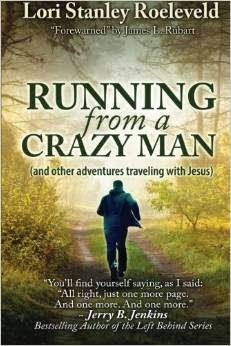 Writer, Do You Have Any Idea What You're Doing?
Writer, Do You Have Any Idea What You're Doing?
by Lori Stanley Roeleveld @LoriSRoeleveld
Don’t say “I work with words.”
Rather say, “I handle hazardous material so combustible it has destroyed careers and incited revolutions.”
Don’t say, “All I can do is write.”
Rather say, “All I can do is create life-infused dispatches from behind enemy lines using the same compound that sparked what the uninformed refer to as the Big-Bang. “
 Don’t say “I write.”
Don’t say “I write.”
Rather say, “I apprentice in my Father’s business, following in His footsteps, and modeling His every move as He is the Master Craftsman. His words produced entire solar systems, the greatest thinkers of our time, and the curve of a woman’s thigh. There is this potential, also, in what I scribble. It may not be evident today but I have endless days to perfect my craft, to create new worlds, to breathe life into the souls I dream.”
Don’t say, “I hope my words are read.”
Rather say, “My desire is that through my art, you will hear the cylinders click into position and know I have unlocked the priceless potential of words. That you will stand and tremble realizing I have unleashed the junkyard dogs of the building blocks of existence containing a force beyond that of a thousand nuclear warheads and that you will not be able to outrun the snarling revelation overtaking you like a truth unchained.”
 Don’t say, “I hope to be published.”
Don’t say, “I hope to be published.”
Rather say, “I hope the blast effects that occur when I combine words in my laptop laboratory will illuminate the heavens so that they cannot be ignored or denied. I hope the radiance of the detonation will inspire the illiterate to learn to read just so they can enter deeper into the experience of the Glorious God my words seek to describe.
I hope the masses fall silent as they stare, open-mouthed and weeping, at the realization that what they thought was only possible in their private dreams is accessible to all and that they grasp my dangling participles to rise above their own shattered stories, their feet lifting from the unforgiving earth, their lungs emptied of the noxious gas of deception, and their victorious laughter fired by the helium of freedom as my words carry them closer to the great God-heart they now know beats also for them. “
Don’t say, “I am a writer.”
Rather say, “I am my Father’s child.”
TWEETABLESWords ARE powerful! author @LoriSRoeleveld shares just how much power they have on @EdieMelson (Click to Tweet)
Writer, do you have any idea what you're doing? - via @LoriSRoeleveld on @EdieMelson (Click to Tweet)
RUNNING FROM A CRAZY MAN (and Other Adventures Traveling with Jesus)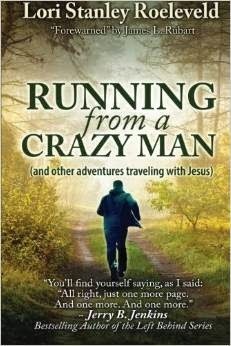 You're restless. Trouble has you gasping beside the narrow road. This is your invitation back to the adventure.
You're restless. Trouble has you gasping beside the narrow road. This is your invitation back to the adventure.
Some Christians leave their relationship with God in a sealed box like a collectible that will be worth something "someday." Not you. You wholeheartedly answered the call to follow Him into the great adventure.
Then, something unexpected happened that left you gasping beside the narrow road. You thought you were following Jesus but now it feels as if all you're doing is running from a crazy man. Even knocked down, though, you seek the strength to continue the journey.
This isn't a book for the happily comfortable. This is a book for the restless Jesus lover, the longsuffering disciple, the openhearted believer. Be forewarned. The challenges inside are designed to unsettle you as well as provide practical suggestions for thriving on the narrow road even if trouble is your travel companion.
Running from a Crazy Man (and Other Adventures Traveling with Jesus) is a siren call to the modern believer that the God-adventure can happen even when, like King David, you re running from a crazy man.
 Lori Stanley Roeleveld is a disturber of hobbits who enjoys making comfortable Christians late for dinner. Her new book,
Running from a Crazy Man (and other adventures traveling with Jesus)
releases in December 2014. Subscribe to her blog and receive a free download of “Free to Face the Headlines.” You’ll find Lori at her website www.loriroeleveld.com or on her front porch writing.
Lori Stanley Roeleveld is a disturber of hobbits who enjoys making comfortable Christians late for dinner. Her new book,
Running from a Crazy Man (and other adventures traveling with Jesus)
releases in December 2014. Subscribe to her blog and receive a free download of “Free to Face the Headlines.” You’ll find Lori at her website www.loriroeleveld.com or on her front porch writing.
 Writer, Do You Have Any Idea What You're Doing?
Writer, Do You Have Any Idea What You're Doing?by Lori Stanley Roeleveld @LoriSRoeleveld
Don’t say “I work with words.”
Rather say, “I handle hazardous material so combustible it has destroyed careers and incited revolutions.”
Don’t say, “All I can do is write.”
Rather say, “All I can do is create life-infused dispatches from behind enemy lines using the same compound that sparked what the uninformed refer to as the Big-Bang. “
 Don’t say “I write.”
Don’t say “I write.”Rather say, “I apprentice in my Father’s business, following in His footsteps, and modeling His every move as He is the Master Craftsman. His words produced entire solar systems, the greatest thinkers of our time, and the curve of a woman’s thigh. There is this potential, also, in what I scribble. It may not be evident today but I have endless days to perfect my craft, to create new worlds, to breathe life into the souls I dream.”
Don’t say, “I hope my words are read.”
Rather say, “My desire is that through my art, you will hear the cylinders click into position and know I have unlocked the priceless potential of words. That you will stand and tremble realizing I have unleashed the junkyard dogs of the building blocks of existence containing a force beyond that of a thousand nuclear warheads and that you will not be able to outrun the snarling revelation overtaking you like a truth unchained.”
 Don’t say, “I hope to be published.”
Don’t say, “I hope to be published.”Rather say, “I hope the blast effects that occur when I combine words in my laptop laboratory will illuminate the heavens so that they cannot be ignored or denied. I hope the radiance of the detonation will inspire the illiterate to learn to read just so they can enter deeper into the experience of the Glorious God my words seek to describe.
I hope the masses fall silent as they stare, open-mouthed and weeping, at the realization that what they thought was only possible in their private dreams is accessible to all and that they grasp my dangling participles to rise above their own shattered stories, their feet lifting from the unforgiving earth, their lungs emptied of the noxious gas of deception, and their victorious laughter fired by the helium of freedom as my words carry them closer to the great God-heart they now know beats also for them. “
Don’t say, “I am a writer.”
Rather say, “I am my Father’s child.”
TWEETABLESWords ARE powerful! author @LoriSRoeleveld shares just how much power they have on @EdieMelson (Click to Tweet)
Writer, do you have any idea what you're doing? - via @LoriSRoeleveld on @EdieMelson (Click to Tweet)
RUNNING FROM A CRAZY MAN (and Other Adventures Traveling with Jesus)
 You're restless. Trouble has you gasping beside the narrow road. This is your invitation back to the adventure.
You're restless. Trouble has you gasping beside the narrow road. This is your invitation back to the adventure. Some Christians leave their relationship with God in a sealed box like a collectible that will be worth something "someday." Not you. You wholeheartedly answered the call to follow Him into the great adventure.
Then, something unexpected happened that left you gasping beside the narrow road. You thought you were following Jesus but now it feels as if all you're doing is running from a crazy man. Even knocked down, though, you seek the strength to continue the journey.
This isn't a book for the happily comfortable. This is a book for the restless Jesus lover, the longsuffering disciple, the openhearted believer. Be forewarned. The challenges inside are designed to unsettle you as well as provide practical suggestions for thriving on the narrow road even if trouble is your travel companion.
Running from a Crazy Man (and Other Adventures Traveling with Jesus) is a siren call to the modern believer that the God-adventure can happen even when, like King David, you re running from a crazy man.
 Lori Stanley Roeleveld is a disturber of hobbits who enjoys making comfortable Christians late for dinner. Her new book,
Running from a Crazy Man (and other adventures traveling with Jesus)
releases in December 2014. Subscribe to her blog and receive a free download of “Free to Face the Headlines.” You’ll find Lori at her website www.loriroeleveld.com or on her front porch writing.
Lori Stanley Roeleveld is a disturber of hobbits who enjoys making comfortable Christians late for dinner. Her new book,
Running from a Crazy Man (and other adventures traveling with Jesus)
releases in December 2014. Subscribe to her blog and receive a free download of “Free to Face the Headlines.” You’ll find Lori at her website www.loriroeleveld.com or on her front porch writing.
Published on December 02, 2014 01:00



